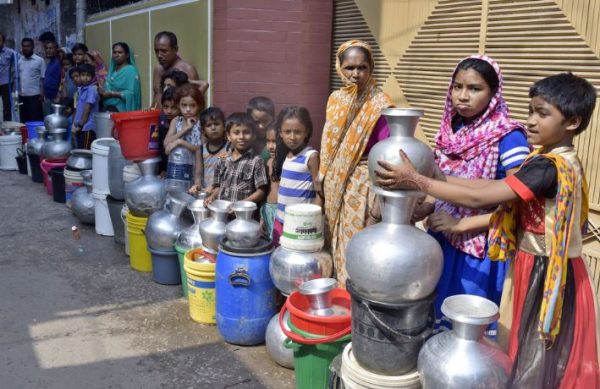

A Sight Too Common
When you feel the effects of the water crisis coming your way, and have absolutely no doubt that you will feel it, with no ifs around this one, this will be one crisis we will be left with no one to blame.
In India, we look set to face a challenge on multiple fronts when it comes to water. Be it the faster melting of Himalayan glaciers, which ironically send down more water for now, or the unbelievable damage we have done to our groundwater reserves, and the finally, the reckless pollution we have caused in our prized water sources, be it rivers, lakes or even the sea, the water crisis is one crisis we are heading into with full knowledge of the consequences.
If the government’s own Niti Aayog predicted a groundwater crisis by as early as 2020, the latest addition to the long list of warnings is the report called “The Hindu Kush Himalayan assessment”, by the International Centre for Integrated Mountain Development (ICIMOD). The ICIMOD is a Kathmandu based organisation, funded by the 8 countries in and bordering the Hindu Kush Mountains that it serves. According to their latest study, even capping global warming at 1.5 degrees will not be enough to stop the slow depletion of the Himalayan glaciers that has started. Accelerated warming, as seems likely at least till 2030 for now, will only make things worse, faster. Philippus Wester, who led work on the report says that ” this is the climate crisis they haven’t heard of’. Adding that ” in the best of possible worlds, if we get really ambitious in tackling climate change, even then we would lose one third of the glaciers and be in trouble. That for us was the shocking finding”. No one will deny that we are not in the best possible world right now, with a small but influential minority that includes the head of the most powerful nation even able to deny climate change exists.
The consequences will be devastating, in more ways than one. Right off the blocks is the reaction of the affected countries, depending on how much they believe the findings. Countries like Pakistan, China and India that benefit from the rivers fed by these glaciers are more likely to get prickly about any plans for these rivers by someone else. We can see that manifesting in the threats, and equally paranoid reactions from Pakistan at any mention of India doing more with its share of Indus waters, for instance. The shoe is on the other foot for India when it comes to the Brahmaputra, and Chinese plans to divert its waters. Since the 1970’s about 15% of the Hindu Kush Range’s water has been lost, though on such a vast range, effects have varied.
So with 2 billion people potentially who could be affected, what can these countries do?
In India, the answer is very simple. Our single most critical resource, groundwater . The reckless extraction that has made us the world’s no. 1 in groundwater dependence and extraction needs to be shelved as soon as possible, and our approach to our groundwater levels needs to change from halting further depletion to actually raising levels on a war footing. It’s the same with climate change, where, in an ideal scenario, the world would agree to halt further warming by giving up, say fossil fuels and industrial meat production altogether. But that’s not going to happen anytime soon.
Polluting critical channels like rivers and lakes needs to be stopped too, and it will take much more than advertising to do that. We believe environmental awareness needs to be part of every school curriculum, and go all the way to green ratings and appraisals for municipalities and corporate India.
When it comes to our natural resources, we have been poor guardians, perhaps hoping for nature to ‘fix’ it, or provide for ever. And making laws, just in case. Now that we have let ouselves down, its time we followed the man made laws, which strangely enough, do exist. Rainwater harvesting notifications were first issued 2 decades ago, and serve to remind us that its not like we didn’t see the crisis coming. We just chose to ignore it, willfully.
1. The mandate for blending Compressed Biogas (CBG) with natural gas has come into effect…
Andhra Pradesh is striving towards greening its energy sector with quite some speed. In a…
With an objective to bolster India’s green energy goals, a Tripartite Agreement has been signed…
The Union MNRE Minister Pralhad Joshi launched the Green Hydrogen Certification Scheme of India (GHCI)…
India’s energy conglomerate Bharat Petroleum Corporation Limited (BPCL) has commissioned a 5MW green hydrogen plant…
In a historical development, the European Space Agency (ESA) has successfully launched its pioneering ‘Biomass’…